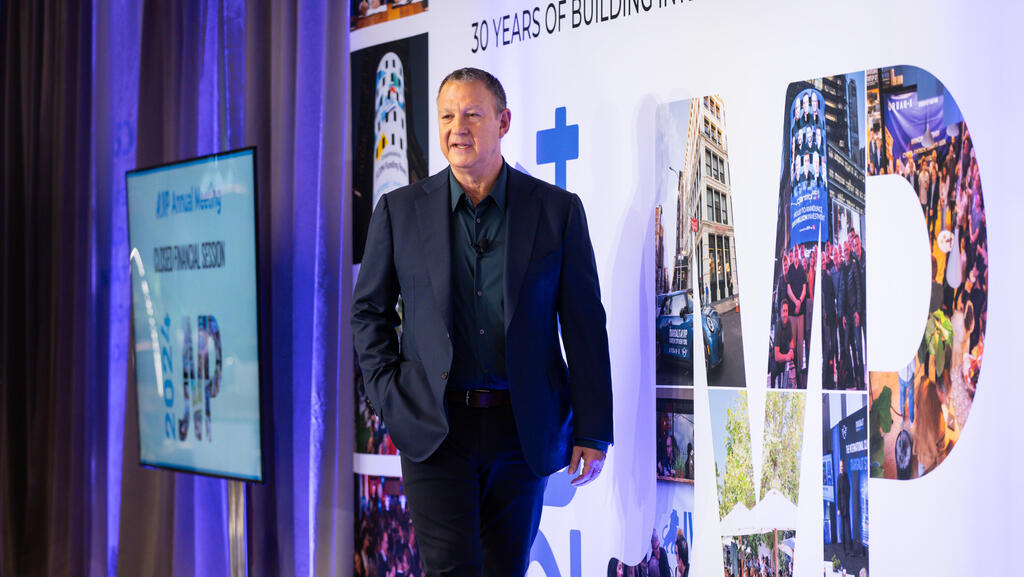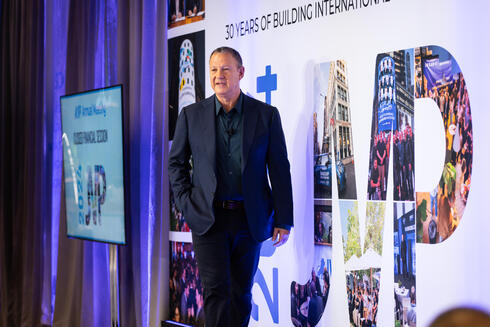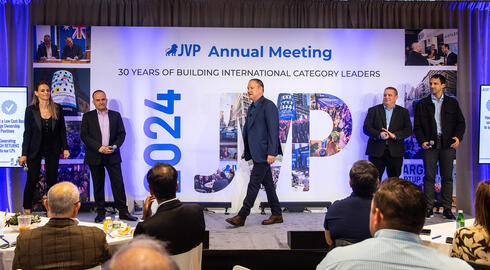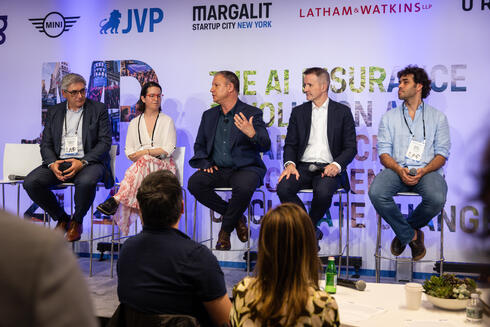
JVP partners with global insurance leaders to launch international initiative boosting AI technologies in insurtech and climatetech
Hundreds of startups, investors, global insurance industry leaders, bankers, and international tech leaders came together at JVP's annual meeting in NYC, showcasing a robust testament to international partnership and support for Israeli innovation
JVP (Jerusalem Venture Partners) under the leadership of its founder and chairman, Erel Margalit, gathered in New York for the JVP 2024 Annual Meeting. At the event, JVP announced the launch of an international initiative to boost AI technologies in Insurtech and Climtetech, attracting delegations comprising hundreds of investors from across the globe, including North America, South America, Australia, Europe, Asia and, notably, Israel.
The event attracted some of the largest investment entities globally, encompassing sovereign funds, insurance companies, banks, family offices, institutions, and governmental funds. Additionally, international partners of JVP and its portfolio companies, which have significantly expanded their global footprint over the past year, were also in attendance. These companies lead various sectors such as cybersecurity, Fintech, Insurtech, and AI, forging new partnerships with prominent global tech players and corporations.
JVP’s partners Yoav Tzruya, Gadi Porat, and Shimrit Kenig conducted sessions with JVP's portfolio companies, which effectively bolstered their international presence over the past year. These companies have emerged as leaders in various sectors, such as cybersecurity, Fintech, Insurtech, and AI, while establishing new partnerships with key players in the global tech industry. Notable among these partnerships are Earnix, Nanit, ControlUp, Coro, Thetaray, Pyramid Analytics, Inshur, Centrical, Akeyless, Appdome, and Chain Reaction – companies that have shown dramatic growth and are on the way to becoming international category leaders in their fields.
"This is one of the most exciting investor events we've had," said Erel Margalit, Founder and Chairman of JVP. "To convene hundreds of investors after seven tough months and showcase to them the power of Israeli high-tech, despite the challenges of war, instills us with strength and hope. Israeli high-tech plays a significant role in maintaining Israel's global connections. Even in challenging times when Israel's diplomacy is strained and doors are closing, we remain committed to building bridges, fostering collaborations, and forging alliances. In moments when Israel's legitimacy is questioned, we stand firm, demonstrating even greater strength and resolve as we chart the path forward for Israel's new diplomatic, economic, and security leadership. This is at the core of our mission."
Since its establishment in 1993, JVP has been at the forefront of investment strategies in core areas, building expertise and solidifying its position as a global leader. Its focus areas include cybersecurity, AI, Fintech, and Insurtech, leading to the creation of significant companies like CyberArk, QLIK tech, and many others.
The 2024 Annual Meeting was held at the International Cyber and Climatetech Center - Margalit Startup City NYC, a strategic partnership between JVP, the New York City Municipality, Australian insurance companies IAG, BMW Group's MINI, URBAN-X, and other key partners.
As part of the Investors Event in New York, JVP convened a pivotal discussion addressing the critical link between the AI revolution and the global insurance sector, particularly in facing the pressing challenge of climate change. This gathering saw the participation of several prominent insurance companies worldwide, including Howden Tiger, Shin Kong Life, Munich Re, and Winbond, alongside Israeli startups pioneering innovative AI technologies tailored for managing natural disasters and climate-related risks.
In light of escalating natural disasters in recent years, private insurers in many countries have ceased offering coverage against natural disasters, resulting in soaring premiums, with projections indicating further exacerbation. This situation underscores the pressing need for proactive risk management strategies.
Recognizing the imperative to confront these challenges, the global insurance industry acknowledges the transformative potential of AI technologies fueled by real-time dynamic data. These technologies offer significant opportunities for insurers to equip themselves with advanced tools and insights, extending coverage to underserved populations lacking adequate insurance solutions. From early-stage wildfire detection sensors to systems capable of assessing groundwater levels, these technologies also facilitate the creation of effective carbon credits and more sustainable practices.
In this pursuit of technological advancement, Israeli high-tech firms, renowned for delivering AI solutions across various industries, bring promise to the insurance sector in effectively addressing the complexities of climate change.
Dr. Marcus Winter, President & CEO NA, Munich Re, "Our commitment to addressing the climate challenge dates back to 1974, with ongoing research, publications, and risk mitigation efforts. Our primary focus has been protecting against natural disasters such as hurricanes and severe storms and we understand the immense pain caused by large-scale disasters and invest heavily in comprehending their impact on economies, communities, and industries worldwide. From floods to wildfires, the severity of these events continues to escalate, posing greater risks to both insurance sectors and global economies.
Cecilia Kushner, Chief Strategy Officer, NYCEDC, "Our goal is to diversify the city's economy by leveraging its competitive advantages in emerging sectors. Just two months ago, we unveiled our Green Economy Action Plan, outlining the city's vision for the future. Currently, 130,000 New Yorkers are employed in the green economy, and by 2040, we aim to increase this number to 400,000 through innovation and new practices, with AI playing a pivotal role. Whether it's in offshore wind operations or energy transmission, AI companies are revolutionizing how we approach sustainability. By harnessing AI for real-time energy consumption insights, property owners can make informed decisions towards building electrification. This underscores the immense potential of AI in this space. Additionally, the correlation between climate risk assessment and informed decision-making is crucial for safeguarding vulnerable populations. This will be a defining challenge for our generation in the years to come."
Robin Gilthorpe, CEO, Earnix, one of JVP’s portfolio companies that specializes in the development of AI technologies for the insurance and banking industries, said, "We're seeing shifts in risk profiles that demand our attention—new types of risks emerging at greater magnitudes. Frequency, severity, and levels of risk are fundamentally altering our evaluation and selection criteria. To maintain accessible insurance at reasonable prices, we're delving into unconventional data sources. However, these sources present challenges—they arrive in novel formats, swiftly and from often inaccessible origins for our core systems. Our focus lies in ensuring we can harness any data type, whether it's real-time streams from climate sensors or telematics from mobile apps or vehicles."




